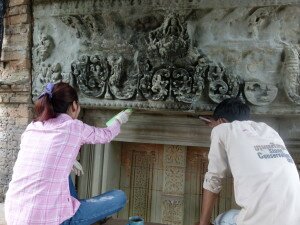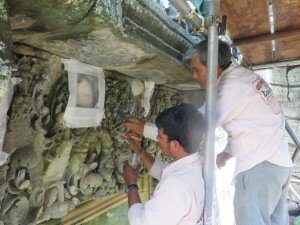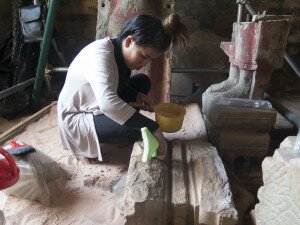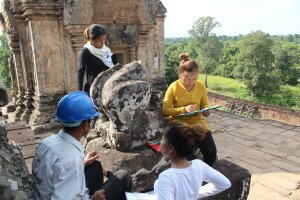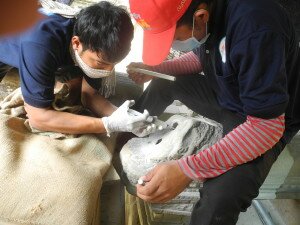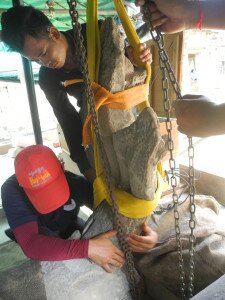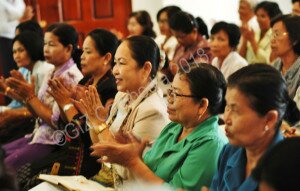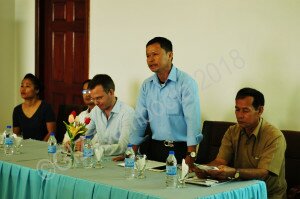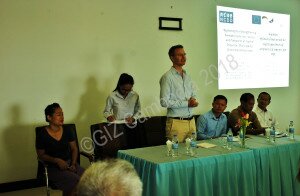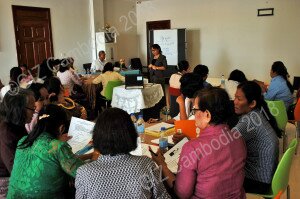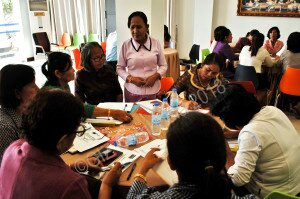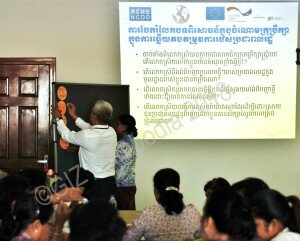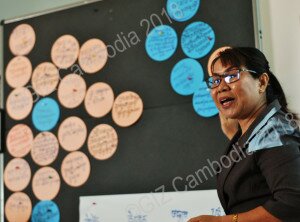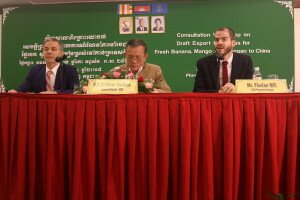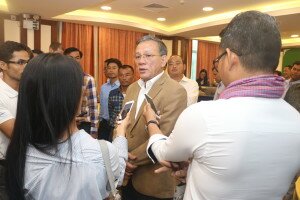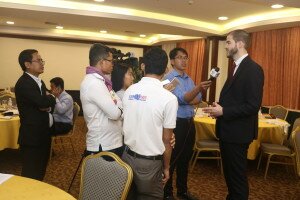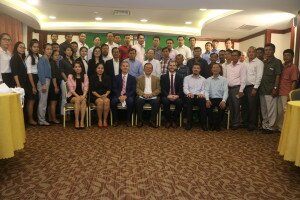10 Years of APSARA Stone Conservation Unit (SCU)
10 April 2018
In March 2007, three local stone conservation experts, with the support of one German Development Worker, started their assignment to establish a competent and fully qualified unit of local stone conservators within the APSARA Authority, the local governmental body tasked with the management and protection of the Angkor World Heritage Site in Siem Reap. And now, ten complete years thereafter the results are compelling.
The temples of Angkor are in constant need of maintenance and care. Having been exposed over a period of hundreds of years to adverse environmental conditions of extreme heat and immense seasonal rainfall their structure and, even more importantly, delicate decorations are at severe risk of complete disintegration. Due to the nature of the weathering processes involved in the deterioration of natural stone and brick, the decay mechanisms present at all Angkorian temples are accelerating at an ever-increasing pace and are now threatening the integrity of this extraordinary World Heritage Site and key tourist destination in the Kingdom.
In order to enable local technicians to competently conserve these fascinating monuments and to curb further deterioration as much as possible, an organisational structure has been established within the Department of Conservation of the APSARA Authority which allows the three local senior experts to operate an effective restoration programme on behalf of the Authority and conduct vocational training schemes for a future generation of professional Cambodian stone conservators with the help of GIZ.
In 2012 a comprehensive training handbook, designed specifically to suit the conservation needs of Angkor has been published bilingually in the Khmer and English languages to provide a detailed and reliable source for students, future junior conservators and trainers alike. Meanwhile, this book has been endorsed by ICCROM, an advisory body to UNESCO, as an example of best practice in the field of conservation for developing countries. Based on the contents of this work of reference a two-yearlong training curriculum has been devised which features classroom lectures as well as practical tuition directly on worksites. With the three local stone conservation experts acting as the main tutors, a first vocational training course involving 20 young Cambodian trainees has been successfully conducted between March 2013 and March 2015 after which all graduated participants have been taken into full time employment by the APSARA Authority because of the tremendous achievements of all participants. The team of currently 19 Cambodian stone conservators is, ever since, fully engaged in continuous conservation efforts on the temples of Angkor while frequently receiving advanced training in specifically identified areas to boost their skills and develop existing competencies even further.
Since its inception a decade ago, more than 60 conservation projects of various sizes have been successfully concluded by the SCU on more than 25 different temple sites throughout the Angkor Park and beyond. Furthermore, the expertise of the unit is a valuable asset to the Authority, which is regularly requested from stakeholders involved in conservation and restoration activities in the Angkor Park.
This year, the SCU celebrates 10 complete years of existence and, at the same time, it has been 5 years since the start of the vocational training scheme and the creation of a new generation of Cambodian stone conservators. During this time, the project evolved greatly and we are currently making arrangements for this occasion to be celebrated duly later this year.
Apart from receiving specialised training in laboratory science and other relevant topics, the SCU is currently engaged in conservation and restoration projects at Prasat Pre Rup and Prasat Banteay Samre. The main focus being the conservation of ornamented surfaces like lintels and pediments besides figurative works embedded in the architectural structure like lion statues and naga balustrades. However, amongst these engagements is also a high profile project conserving two late 12th-century Buddha statues of the Bayon style within a coordinated multidisciplinary conservation framework, reflecting the significance and complexity of the subject and materials involved as well as setting new standards for future intervention approach models in Angkor.
Sebastian Kerridge
claimer
Female Councillor Empowerment through Networking
10 April 2018
Women holding political office in Cambodia do not have it easy. They often encounter prejudice and lack of understanding, and there is little trust in their abilities. They are also underrepresented at all levels of government. In light of this, the National Committee for Sub-national Democratic Development (NCDD-S) with support from the GIZ implemented EU Project for Decentralisation and Administrative Reform (EU DAR) has taken action. … More >>>
Female Councillor Empowerment through Networking
10 April 2018
Women holding political office in Cambodia do not have it easy. They often encounter prejudice and lack of understanding, and there is little trust in their abilities. They are also underrepresented at all levels of government. In light of this, the National Committee for Sub-national Democratic Development (NCDD-S) with support from the GIZ implemented EU Project for Decentralisation and Administrative Reform (EU DAR) has taken action. The two partners currently conduct a countrywide training programme consisting of six regional training sessions for all 445 female councillors from Cambodia’s Khan, District, Municipality and Province Councils. The trainings focus on allowing female councillors to network with each other by sharing their experiences as elected citizen representatives and also provide them with concrete tools for action that will help them to successfully take on their right of initiative under the councils’ general mandate to find solutions for the service delivery needs of their citizens.
Since there are a lot of female councillors, therefore, the training was divided into 6 regions as the following:
Region 1: Siem Reap province conducted on 27-28 March 2018
Region 2: Pursat province will be conducted on 03rd -04th April 2018
Region 3: Sihanuk province will be conducted on 24-25 April 2018
Region 4: Krate province conducted on 27-28 March 2018
Region 5: Kampong Cham province will be on conducted on 03-04 April 2018
Region 6: Capital will be conducted on 09-10 May 2018.
Two regional training workshops on Strengthening Female Councilors’ Voices and Networks at province, municipality, district level were conducted on 27-28, March in Siem Reap and Kratie provinces, and two others on April 02-04, 2018 in Pursat and Kampong Cham.
These workshops have the following objectives:
- Share experiences among elected councillors
- Strengthen their understanding about the General Mandate as well as Inter- and Intra-governmental Relations
- Strengthen their capacity in proposal writing and raising issues in council meetings (public speaking)
- Discuss how to create sustainable regional female councillors’ support networks
- Identified what is easy/difficult in the roles of female councillors (“Atmosphere Barometer”) for NCDD-S’ learning about capacity development needs of female councilors
Each regional workshop was participated by female councilors from different provinces:
- Siem Reap region: Female councilors from Preah Vihea, Oudor Meanchey, Banteay Meanchey, Kampong Thom and Siem Reap provinces
- Kratie region: Female councilors are from Ratanakiri, Mondulkiri, Stungtreng, Tboung Khmum and Kratie provinces.
- Pusat region: Female councilor are from Battambang, Pailin, Kampong Chhnang, Kompong Speu and Pursat provinces.
- Kompong Cham region: Female councilors are from Prey Veng, Svay Rieng and Kompong Cham provinces
There are in total 365 participants in the four regional workshops including representatives from Ministry of Women Affairs, Ministry of Interior, NCDD-S and Council Association at Capital and Provincial Level and facilitators from NGOs.
As a result, participants are active in discussing and sharing their experiences related to their role and responsibility of being councilors and raising issues for discussion in council’s monthly meeting to respond to citizens’ needs.
E
EU DAR is commissioned by the German Federal Ministry for Economic Cooperation and Development (BMZ), co-financed by the European Union (https://eeas.europa.eu/delegations/cambodia_en) and implemented by the Deutsche Gesellschaft für Internationale Zusammenarbeit (GIZ) GmbH.
claimer
Consultation Workshop on draft export guidelines for fresh banana, mango and longan to China
05 April 2018
ASEAN China Free Trade Agreement (ACFTA) framework was signed in November 2002 in Phnom Penh, Cambodia, and came into effect in January 2010. It marked a significant milestone in pursuing greater economic integration in the region. ACFTA became the largest free trade area in the world in terms of population and the third largest in terms of nominal GDP, trailing the European Economic Area (EEA) and North American Free Trade Area (NAFTA). Under the free trade agreement, tariffs are … More >>>
Consultation Workshop on draft export guidelines for fresh banana, mango and longan to China
05 April 2018
ASEAN China Free Trade Agreement (ACFTA) framework was signed in November 2002 in Phnom Penh, Cambodia, and came into effect in January 2010. It marked a significant milestone in pursuing greater economic integration in the region. ACFTA became the largest free trade area in the world in terms of population and the third largest in terms of nominal GDP, trailing the European Economic Area (EEA) and North American Free Trade Area (NAFTA). Under the free trade agreement, tariffs are reduced to zero on almost 8,000 product categories. China and the six more advanced ASEAN nations (Brunei, Indonesia, Malaysia, the Philippines, Thailand, and Singapore) had progressively removed 90 percent of tariffs by 2010, while Cambodia, Lao PDR, Myanmar and Viet Nam (CLMV) did so in the following five years. ACFTA significantly led the integration process in the region, even though many non-tariff barriers (NTBs) and other trade obstacles still remain.
.
To facilitate trade to China, the regional GIZ programme Support for Economic Cooperation in Sub-Regional Initiatives in Asia (SCSI), commissioned by German Federal Ministry for Economic Cooperation and Development (BMZ) supports Cambodia, Lao PDR, and Viet Nam. In order to map export regulations frame works and awareness-raising for the potentials of ACFTA. Together with partners on site, the programme improves technical assistance on existing NTBs in the agricultural field for export-oriented small and medium sized enterprises (SMEs).
Against this background, SCSI in cooperation with the General Directorate of Agriculture (GDA) organized a Consultation Workshop on drafted guidelines to facilitate export of fresh banana, mango and longan to China. The workshop was held on March 27, 2018 in Phnom Penh. to review and get inputs from participants involved in trading the respective products to improve the drafted step-by-step guidelines. Altogether 57 participants attended the workshop, including representatives from GIZ, public sector (GDA, MoC-Camcontrol, and Custom), traders, associations, logistics companies and producers. The guidelines aim to improve Cambodian businesses to export capacity to China and improve the public-private dialogue as well as political processes between Cambodia and China.
Contact:
Ra Ten
Technical Advisor-Trade Facilitation
Support for Economic Cooperation in Sub-Regional Initiatives in Asia (SCSI), Cambodia
www.connecting-asia.org
isclaimer
